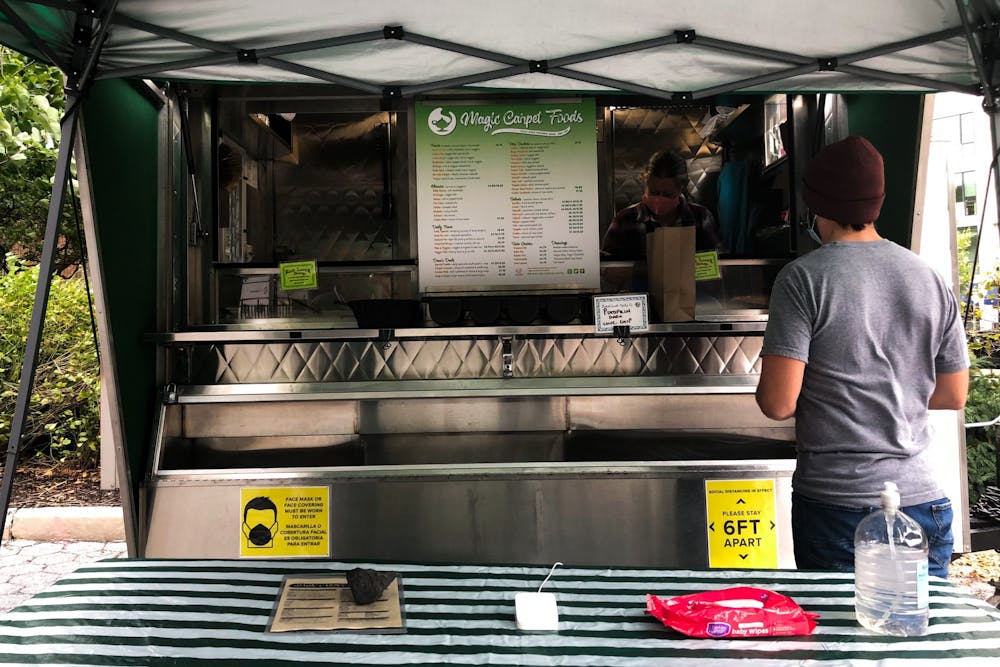Food truck owners on Penn's campus say they are still struggling to keep their businesses alive amid the pandemic, despite the thousands of students who have moved back to University City for the spring semester.
The Daily Pennsylvanian spoke to four local food truck owners about their experiences navigating the pandemic. Although the owners were hopeful about seeing increased revenue when the University decided to welcome all undergraduate students back to campus in January, their economic reality has not been much different than that of last semester, when they were having trouble attracting customers and making ends meet.
“I would say 80% of our customers are students, so obviously it’s a huge change from when everybody was here, compared to now," Leo Saavedra, the owner of Tacos Don Memo, a food truck serving tacos and burritos located on 38th Street next to 1920 Commons, said while comparing their situation pre-pandemic to their situation now.
Even though Saavedra said customer flow has slightly improved since the fall, he said it is still very hard for the truck to make up for the two months in the beginning of the pandemic when the city banned food trucks from operating.
In March 2020, the City of Philadelphia became the only jurisdiction in Pennsylvania to cease food truck operations. Food truck owners were out of business for two months while brick-and-mortar small businesses were allowed to continue in delivery and take-out formats. Following the passing of these strict restrictions, the city tried to make up for it by offering a total of $40 million in relief funds to small businesses, including food trucks, through the COVID-19 Relief Statewide Small Business Assistance program. Businesses could apply to take advantage of these funds online through the city’s official website.
Ajez Uddin, the owner of New York Famous Halal Gyro, one of the halal carts located across from the Quad, said that he is in need of financial help from the city, but was confused by the application process for the grants — which ultimately kept him from applying.
Still, Saavedra and owners of various other food trucks on campus that were successfully able to apply said that they still have not heard back from the city about their loan applications, which they submitted last year.
Hemo Abdelaziz, the owner of the food truck Hemo’s, which is known on campus for its special Hemo sauce, said that he applied for loans from the city last year, but has not gotten a positive response from any of them so far. Without loans and student customers, Abdelaziz said it has been hard to keep business going.
RELATED:
Philadelphia eases COVID-19 restrictions on outdoor dining and sporting events
Philadelphia restaurants can increase indoor dining capacity to 50%
“The situation is the same as last semester; there are not that many students here. And if I don’t start making more money, I’m gonna have to close soon,” Abdelaziz said, adding that the food truck is his only source of income.
Those who have been lucky with their relief fund applications still said that the extra funds have not been enough to sustain their businesses financially.
Like Abdelaziz, Magic Carpet food truck co-owner Debbie Varvoutis said that customer flow during the spring semester is comparable to the fall.
“Each food truck on campus is still doing 20-30 people a day right now, which I used to do in 20 minutes,” Varvoutis said.
Despite receiving a micro-grant of $5,000 from the city in the first round of relief fund applications last year, Varvoutis said the food truck — beloved on campus for its vegetarian fare — is still struggling financially and trying to sustain itself until the fall 2021 semester. In the meantime, she said that the truck will close for the extended summer period and apply for the new round of funds being offered by the city and the federal government.
As part of the $28.6 billion COVID-19 stimulus package offered by the federal government beginning in 2021, the American Rescue Plan will reserve $5 billion in aid for small businesses, including food trucks, that saw less than $500,000 in revenue in 2019. The grant and loan amounts will be based on the difference between 2019 and 2020 sales of the establishments, and the first three weeks of the program will prioritize socially and economically disadvantaged small businesses.
Another thing that Varvoutis said helped Magic Carpet was the GoFundMe page it ran last semester and the ensuing help that poured in from students and alumni who supported the page following the articles published about it. The DP and The Pennsylvania Gazette both penned articles about Varvoutis' efforts to keep the food truck running, which Varvoutis said resulted in students and alumni reaching out to her personally to make contributions.
“Every time there’s an article or [news profile] things pick up a little bit, but then it trickles down,” Varvoutis said. “But it has still been a help, and we’re not ready to go out of business yet.”









